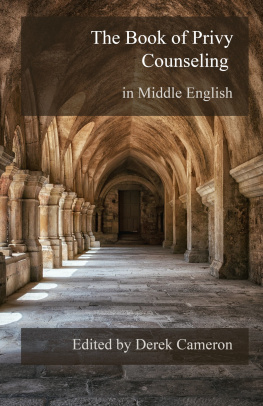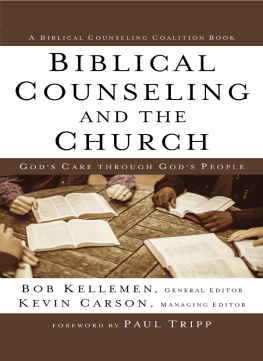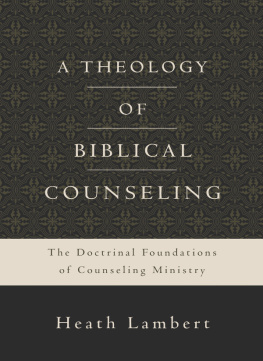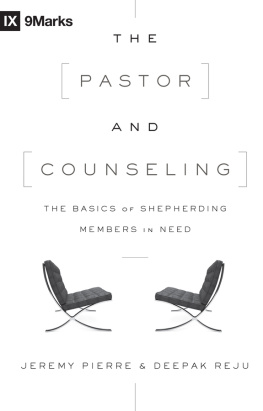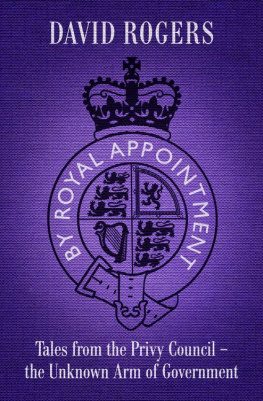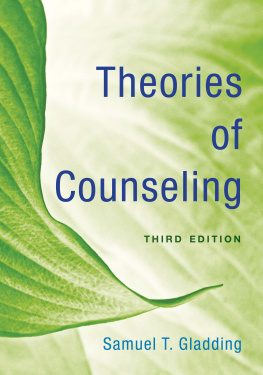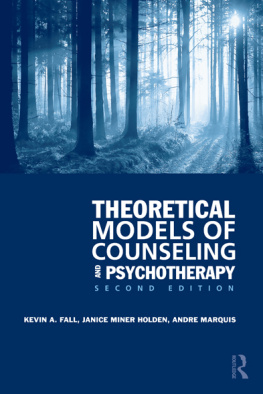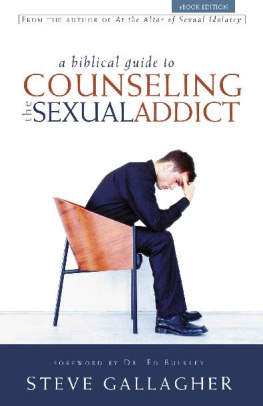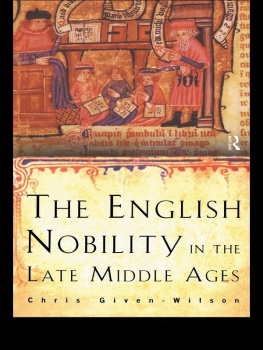Derek Cameron - The Book of Privy Counseling in Middle English
Here you can read online Derek Cameron - The Book of Privy Counseling in Middle English full text of the book (entire story) in english for free. Download pdf and epub, get meaning, cover and reviews about this ebook. year: 2021, genre: Detective and thriller. Description of the work, (preface) as well as reviews are available. Best literature library LitArk.com created for fans of good reading and offers a wide selection of genres:
Romance novel
Science fiction
Adventure
Detective
Science
History
Home and family
Prose
Art
Politics
Computer
Non-fiction
Religion
Business
Children
Humor
Choose a favorite category and find really read worthwhile books. Enjoy immersion in the world of imagination, feel the emotions of the characters or learn something new for yourself, make an fascinating discovery.
- Book:The Book of Privy Counseling in Middle English
- Author:
- Genre:
- Year:2021
- Rating:3 / 5
- Favourites:Add to favourites
- Your mark:
- 60
- 1
- 2
- 3
- 4
- 5
The Book of Privy Counseling in Middle English: summary, description and annotation
We offer to read an annotation, description, summary or preface (depends on what the author of the book "The Book of Privy Counseling in Middle English" wrote himself). If you haven't found the necessary information about the book — write in the comments, we will try to find it.
Derek Cameron: author's other books
Who wrote The Book of Privy Counseling in Middle English? Find out the surname, the name of the author of the book and a list of all author's works by series.
The Book of Privy Counseling in Middle English — read online for free the complete book (whole text) full work
Below is the text of the book, divided by pages. System saving the place of the last page read, allows you to conveniently read the book "The Book of Privy Counseling in Middle English" online for free, without having to search again every time where you left off. Put a bookmark, and you can go to the page where you finished reading at any time.
Font size:
Interval:
Bookmark:
The Book of Privy Counseling was written in England in the late fourteenth century. The author frequently uses the word boistous (meaning rough, simple, or uneducated), whose popularity the Middle English Dictionary places in the 1390s, so that would be a reasonable date for the work.
The text in this electronic version is edited from Phyllis Hodgsons critical edition, as reproduced in Marianne Sommers The Mystagogic Process of The Book of Privy Counseling. I added the paragraph numbers. Hodgsons principal source was the British Librarys Harleian manuscript number 674, beginning at folio 92a. Robert Harley (16611724), first Earl of Oxford, initiated this collection in 1704; Harleys great-granddaughter, Margaret Cavendish Bentinck (17151785), Duchess of Portland, sold the now expanded collection to the nation in 1753.
English in the fourteenth century was written with two extra letters: yogh, written as and (Unicode x'021c' and x'021d') and thorn, written as and (Unicode x'00de' and x'00fe'). Your devices font will need to include these characters to display this electronic version correctly. Writers at the time often used the letter v in place of an initial u, and the letter u where nowadays we would put an internal v.
The author is a kindred spirit of John of the Cross (15421591), urging the novice to remain in the depths of stillness until the arrival of infused contemplation. This practice, or working as the author calls it, eventually becomes continual. Conceptual thinking is abandoned in favor of pure beingness. All feelings of a separate self disappear. This is the path common to all inward-looking traditions, regression to the prepersonal layers of consciousness.
Derek Cameron
British Columbia, Canada
Hodgson, Phyllis. The Cloud of Unknowing and the Book of Privy Counselling. London: Early English Text Society, 1944.
Middle English Dictionary. Ed. Robert E. Lewis, et al. Ann Arbor: University of Michigan Press, 19522001. Online edition in Middle English Compendium. Ed. Frances McSparran, et al. Ann Arbor: University of Michigan Library, 20002018.
Sommers, Marianne J.P. The Mystagogic Process of The Book of Privy Counseling: A hermeneutic narrative research. Doctoral disseration, Radboud University, Nijmegen, Netherlands, 2015.
1. Goostly freende in God, as touching in inward ocupacion, as me ink ee disposid, I speke at is tyme in specyal to i-self, & not to alle oo at is writyng scholen here in general. For if I schuld write vnto alle, an I must write ing at were acordyng to alle generaly. Bot si I at is tyme schal write vnto ee in special, erfore I write none oer ing bot soche as me ink at is moste speedful & acording to in disposicion only. If eny oer be so disposid as ou arte, to whom is writing may profite as vnto ee, in so moche e betir, for I am wel apaied. Neuereles, at is tyme, in owne inward disposicion is only by it-self, as I may conceiue it, e poynte & e prik of my beholdyng. & erfore to ee, in persone of alle oer liche vnto ee, I sei us:
2. Whan ou comyst bi i-self enk not before what ou schalt do after, bot forsake as wel good outes as iuel outes. & prey not wi i mou bot ee list rit wel; & an, if ou out schalt sey, loke not how moche ne how litil at it be, ne charge not what it is ne what it bemeni, be it orison, be it psalm, ympne or antime, or any oer preyer, general or specyal, mental wi-inne enditid bi out or vocale wi-outen by pronounsyng of worde. & loke at noing leue in i worching mynde bot a nakid entent streching into God, not cloid in any specyal out of God in hym-self, how he is in him-self or in any of his werkes, bot only at he is as he is. Lat hym be so, I prey ee, & make him on none oer wise. Seche no ferer in hym by sotiltee of witte. at byleue be i grounde. is nakid entent, freely fastenid & groundid in verrey beleue, schal be nout elles to i out and i felyng bot a nakid out & a blynde feling of in owne beyng: as if ou seidist us vnto God with-inne in i menyng, at at I am, Lorde, I offre vnto ee, wi-outyn any lokyng to eny qualite of i beyng, bot only at ou arte as ou arte, wi-outen any more.
3. at meek derknes be i mirour & i mynde hole. enk no ferer of i-self an I bid ee do of i God, so at ou be on wi hym in spirit as us, wi-outyn departyng & scatering of mynde. For he is i being, & in him ou arte that at ou arte, not only bi cause & bi beyng, bot also he is in ee bo i cause & i beyng. & erfore enk on God as in is werk as ou dost on i-self, & on i-self as ou dost on God, at he is as he is & ou arte as ou arte, so at i out be not scaterid ne departid, bot onid in hym at is al; euermore sauyng is difference betwix ee & him, at he is i being, & ou not his. For of it be so at alle ings ben in hym bi cause & bi beyng, & he be in alle inges here cause & here being, it in him-self only he is his owne cause and his owne being. For as noing may be wi-outyn him, so he may not be wi-outyn him-self. He is being boe to him-self and to alle. & in at he is only departid from alle that he is being boe of hym-self & of alle; & in at he is one in alle & alle in him, that all inges han her beinges in him, & he is being of alle. us schal i out & i feling be onid wi him in grace wi-outyn departing, alle corious sechinges in e queinte qualitees of i blinde beyng or of his fer put bac; at i out be nakid & i felyng noing defoulid, & ou, nakidly as ou arte, wi e touching of grace be priuely fed in i felyng only wi hym as he is; bot blyndly & in partie, as it may be here in is liif, at i longing desire be euermore worching.
4. Loke up en litly & sey to i Lorde, ouer wi mou or mening of hert: at at I am, Lorde, I offre vnto ee, for ou it arte. & enk nakidly, pleynly, & boistously at ou arte as ou arte, wi-outyn any maner of coriouste.
5. is is litil maistrie for to ink, if it were bodyn to the lewdist man or womman at leui in e comounist wit of kynde in is liif, as me enki. & erfore softely, mornyngly & smylingly I merueyle me somtyme whan I here sum men sey (I mene not simple lewid men & wommen, bot clerkes & men of grete kunnyng) at my writyng to ee & to oer is so harde & so hei, & so curious & so queinte, at unnees it may be conceiuid of e sotelist clerk or wittid man or womman in is liif, as ei seyn. Bot to ees men most I answere & sey at it is moche wori to be sorowid, & of God & his louers to be mercyfuly scornid & bitterly reprouid, at now ees dayes not only a fewe folkes, bot generaly nihond alle (bot if it be one or two in a contrey of e specyal chosen of God) ben so bleendid in here coryous kunning of clergie & of kynde, at e trewe conceite of is lit werk orow e whiche e boistousest mans soul or wommans in is liif is verely in louely meeknes onyd to God in parfite charite, may no more, ne it so moche, be conceyuid of hem in sofastnes of spirit, for her blyndnes & here corioustee, en may e kunnyng of e grettest clerk in scole of a ong childe at his A.B.C. & for is blyndnes erryngly ei clepin soche simple teching coriouste of witte, whan, if it be witterly lokyd, it schal be founden bot a symple & lit lesson of a lewid man.
6. For I holde him to lewyd & to boistous at kan not enk & fele at him-self is, not what him-self is bot at hym-self is. For is is pleynli proprid to e lewdist kow or to e moste vnresonable beest (if it mit be seide, as it may not, at one were lewder or more vnresonable en anoer) for to fele e owne propre beyng. Moche more an it is proprid to man, e whiche is singulerly endowid wi reson abouen alle oer beestes, for to enk & for to fele his owne propre being.
7. & erfore com doun into e lowest poynte of i witte, e which sum man holde by verrey preof at it is e hiest, & enk on e lewedest maner, bot bi sum man e wisest, not what i-self is, bot at i-self is. For whi to ee for to enk what ou arte in alle propirte longe moche crafte of clergie & of kunnyng & moche sotil seching in i kyndely wittys. & is hast ou done now many day wi help of grace, so at ou wost now as in partye, & as I suppose it is profitable to ee for e tyme, what thou art: a man in kind & a foule stinking wreche by synne. ou knowest wel how; & perauenture ee enkith sumtyme to wele alle e filis at folowen & fallen to a wreche. Fy on hem! Late hem go, I prey ee. Stire no ferer in hem for ferde of stynche. Bot for to enk at ou arte, mayest ou haue of i lewydnes & i boistouste wi-outyn any grete kunning of clergie or of kynde.
Font size:
Interval:
Bookmark:
Similar books «The Book of Privy Counseling in Middle English»
Look at similar books to The Book of Privy Counseling in Middle English. We have selected literature similar in name and meaning in the hope of providing readers with more options to find new, interesting, not yet read works.
Discussion, reviews of the book The Book of Privy Counseling in Middle English and just readers' own opinions. Leave your comments, write what you think about the work, its meaning or the main characters. Specify what exactly you liked and what you didn't like, and why you think so.

